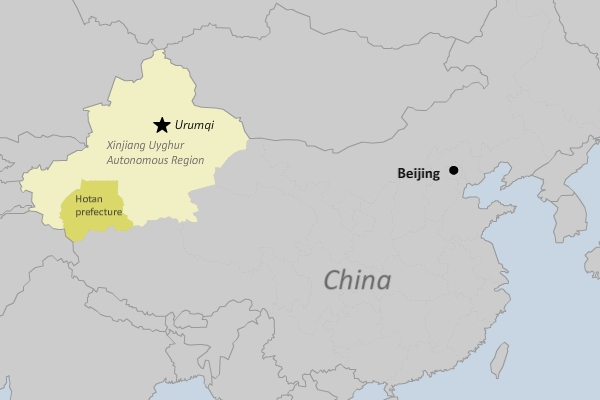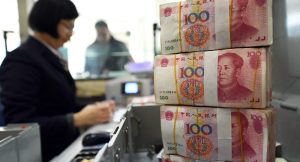RPT-Security clampdown in far-western China exacts toll on businesses

Reuters, 28 June 2017
 By Sue-Lin Wong — The economy of the vast Xinjiang region in far western China is officially growing at a robust pace, faster than the country as a whole. That is largely thanks to big investments in infrastructure from Beijing as the region – with its links to much of central Asia – is critical to Chinese President Xi Jinping’s new Silk Road initiative.
By Sue-Lin Wong — The economy of the vast Xinjiang region in far western China is officially growing at a robust pace, faster than the country as a whole. That is largely thanks to big investments in infrastructure from Beijing as the region – with its links to much of central Asia – is critical to Chinese President Xi Jinping’s new Silk Road initiative.
But traders, business owners and residents in Xinjiang’s capital, Urumqi, are seeing little benefit from the central government’s cash injection, according to about 20 interviews with people in the city.
One major reason for that, they say, is due to tightened security as the Chinese government seeks to control one of its biggest domestic threats. Beijing accuses separatist extremists among the Muslim Uighur ethnic minority of plotting attacks on the ethnic Han majority in Xinjiang and other parts of China, following a series of violent events in recent years.
As a result, there are roadblocks and stringent security checks across the region, including at restaurants, hotels and shops, making it slow and frustrating to move around.
The new Silk Road, officially known as the Belt and Road initiative, is Xi’s signature foreign and economic policy which aims to increase economic and political ties through roads, railways and other projects that link China to Central Asia and beyond. But the contrast between that ambition and the views at street level in Urumqi reflects the difficulty Beijing faces in trying to balance security against its other top priorities.
This is particularly the case as China is determined to avoid any trouble ahead of a critical Communist Party congress in the autumn at which Xi is expected to consolidate his power, and as it faces the threat from some Uighurs who have become battle-hardened Islamic State fighters in the war in Syria and Iraq and may return home.
DELIVERIES DIFFICULT
The impact of the clampdown is clear at the Frontier International Trade Centre in Urumqi, where padlocked stores outnumber traders.
“Business became really bad last year. I’ve got nothing to do except a stock-take,” said Wei Chun, a shoe trader, surrounded by piles of high-heels.
She blames poor sales partly on the impact of sluggish economies in neighbours Kazakhstan, Kyrgyzstan and Tajikistan, among the eight countries with which Xinjiang has borders. But she also says the Chinese authorities’ obsession with keeping Xinjiang secure at all costs is making it tough to do business here.
“It’s very difficult to send and receive deliveries because of the security crackdown,” she said, complaining that authorities will often shut down the delivery system for “security reasons”.
The Xinjiang government declined to make officials available for comment for this article. It also did not respond to a series of faxed questions.
Xu Bin, the head of the Xinjiang government’s statistics bureau, told reporters in February that its growth – which was 7.6 percent last year – is mostly fuelled by fixed asset investment. But he then added: “Xinjiang faces slowing economic growth, falling industrial prices, companies are feeling the pain of falling profits and the growth rate of our tax revenue has dropped off.”
Xinjiang’s trade with other countries fell in the first quarter of this year, according to the customs bureau, and is still below the level it recorded in the first quarter of 2013, the year that Belt and Road launched.
Much of that drop was because a slump in the rouble in 2014-2015 hurt Xinjiang’s neighbours, and following the 2015 establishment of the Russian-led Eurasian Economic Union (EEU). That aims to develop Central Asia and lessen its reliance on Chinese goods.
EVENTS CANCELLED
People here point to many disruptions in ordinary life as one reason the economy doesn’t feel buoyant at street level.
Group gatherings, whether for charity fun runs or trade expos, are often banned or cancelled at the last minute, they say. Phone lines sometimes go dead, and there’s no 4G internet because the authorities fear high-speed internet would help militants organize.
While Belt and Road has created opportunities, small businesses complain these projects often reward large state-owned enterprises.
“The Belt and Road Initiative doesn’t help small businessmen like me,” said Zhou Bangquan who sells men’s shoes in Urumqi. “It helps big state-owned enterprises that do energy or have big infrastructure projects.”
Among the projects financed are a highway to Pakistan and a network of high-speed railroads connecting cities in Xinjiang and the rest of China, with 1.5 trillion yuan ($220 billion) in capital investment expected in the region this year alone.
But it is unclear how much of the money is used to buy materials from factories outside the region or ends up being sent to other provinces by workers brought in temporarily from elsewhere in China.
It’s not just heightened security measures that concern businesses. People are required to attend flag ceremonies and other patriotic education, instead of working, say locals. Such events are meant to encourage Uighurs to become patriotic Chinese citizens but can also be used to monitor their behaviour.
PATRIOTIC EDUCATION
“I’m losing my mind, I’ve already had six staff sent back to their hometowns this past month for study,” said a restaurant manager in Urumqi who, like many people Reuters spoke to in Xinjiang, declined to be named because of the sensitivity of the issue.
His Uighur staff were required to return home to southern Xinjiang for one month’s study of Mandarin Chinese, another month learning about China’s legal system and a month of vocational training, he said.
“We all spend so much time doing things that aren’t our actual jobs. I have to take my staff to watch a flag-raising forty weeks of the year. If I don’t, I will be taken away for thirty days of study,” he said.
As well as the time spent on such matters, Uighurs – who represent just over 45 percent of the population – are being increasingly marginalized by the Han Chinese, undermining the overall economy.
Three Han Chinese entrepreneurs told Reuters local authorities had told them not to employ Uighurs. And a Han Chinese real estate agent in Urumqi said he had been told not to sell properties to Uighurs from southern Xinjiang.
There has been a change in attitude towards balancing stability and economic growth in Xinjiang since Chen Quanguo became its new Communist Party boss last August in what analysts say was an implicit endorsement of his previous hard-line management of ethnic strife in Tibet.
“Xinjiang used to have a policy of ‘with one hand we maintain stability, with the other hand we grow the economy’ but now it’s just ‘maintain stability with both hands, at all costs’,” said a local businessman and former government official.
Chen said in a speech last September that “all our work in Xinjiang revolves around maintaining a tight grip on stability.”
Reporting by Sue-Lin Wong for Reuters; Additional reporting by the Beijing Newsroom; Editing by Martin Howell
http://in.reuters.com/article/china-economy-xinjiang-idINL3N1JP1IF

